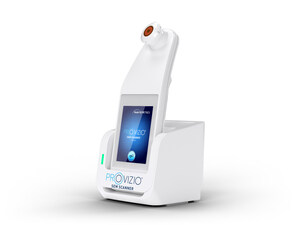BBI to Build First Digital Surveillance System for Pressure Ulcers
Platform Combines SEM Scanner Detection with NHS-developed Pressure Ulcer Management Tool
MANCHESTER, England and LOS ANGELES, July 19, 2016 /PRNewswire/ -- Medical device company Bruin Biometrics, LLC ("BBI"), is linking the SEM Scanner, its wireless point-of-care device for pressure ulcer detection, to a digital registry for pressure ulcers known as "PUNT" (Pressure Ulcer Notification Tool) as it steps up its war on a life-threatening condition that claims as many lives in the US as most cancers. Today, pressure ulcers impact nearly 5 million patients in Europe and North America with treatment costs exceeding $13B -- nearly 500,000 of those cases occur in the United Kingdom, posing a £2.1bn problem to the NHS.
BBI today announced that it has licensed PUNT, an online tool conceptualized by tissue viability expert Mark Collier and developed by United Lincolnshire Hospitals NHS Trust (ULHT), one of the largest acute hospital trusts in England.
PUNT has been used within ULHT to facilitate real-time recording of in-patient pressure injury and directly links with the Trust's patient management system to standardize and facilitate intervention and treatment. Since incorporating PUNT into pressure ulcer prevention protocols in 2011, the Trust has reduced the incidence of hospital-acquired pressure ulcers (HAPUs) by nearly 40% to 0.9%, compared with the national reported incidence rate of 4-6%.
BBI will offer PUNT as a complement to its SEM Scanner, the first and only device to reveal pressure-induced tissue damage happening beneath the skin's surface up to 10 days ahead of visual signs of damage occur (O'Brien 2015).
The addition of PUNT strengthens SEM Scanner's position as the first prevention, warning and management system for pressure ulcers. With this system, there will be one place to track and retrieve information on patient diagnosis, treatments and progress across care settings as patients move from home care to acute care and to community care settings. This system's benefits will transform pressure ulcer patient management by:
- Incorporating patient diagnostic information (e.g., SEM Scanner values) as a critical data point in developing a personalized pressure ulcer care plan;
- Facilitating early intervention and improved compliance through alerts for clinicians, i.e. based on SEM Scanner detection of pressure injury or when assessments are overdue, and lists appropriate care interventions;
- Enabling patient-centered, joined-up care across care settings from prevention through recovery; and,
- Creating an online, electronic platform that could serve as a global pressure ulcer registry – to collect and report population data, and to use evidence-based prevention and care pathways based on actual patient outcomes.
SEM Scanner is CE Mark approved and is currently in commercial launch in the EU and Canada. PUNT is currently deployed in United Lincolnshire Hospitals NHS Trust.
Quotes:
Martin Burns, BBI CEO: "Our mission is to reduce pressure ulcer incidence. The combination of the SEM Scanner to detect early stage pressure ulcers and then PUNT to manage all pressure ulcers from point of first development to discharge from care is a breakthrough. So now patients, for the first time ever, will have their wound care data be evidenced-based and transferable between care settings. This solution aligns with the needs of nurses and health systems to provide patient-centered preventative care and then demonstrate protocol compliance, even as patients transition between care settings."
Rachael Lester, BBI VP Product: "Wound care is catching up to fields like oncology which have employed advanced diagnostics and patient registry data to shift the care pathway earlier toward prevention and to personalize medicine based on a patient's specific pathogenesis. For the first time in wound care, we are combining the power of these proven tools to bring those same benefits to patients at risk for pressure ulcers."
Mark Collier, tissue viability nurse consultant at ULHT who developed PUNT and British Journal of Nursing's 2016 Pressure Care Nurse of the Year: "PUNT greatly reduced overhead and staff time required to report and monitor pressure ulcers and improved patient information management across our four hospitals."
About Pressure Ulcers
Pressure ulcers are a common medical problem that can lead to pain, disfigurement, infection and death. Also known as bedsores, pressure sores or decubitis ulcers, pressure ulcers are an area of localized damage to the skin and underlying tissue – usually around an area of bony prominence, such as the sacrum, coccyx, heels, and hips – that results from pressure involving shear and/or friction. Across Europe and the United States, it is estimated that 18%-25% of patients in both acute care and long-term care settings suffer from pressure ulcers, disproportionately impacting the elderly and patients with limited mobility. There are some 2.5 million pressure ulcer cases annually in the European Union, with nearly 500,000 of those cases in the United Kingdom: a £2.1bn problem to the NHS. In the US, some 2.5 million Americans develop pressure ulcers annually in acute care facilities, costing the US health system $11B. Each year, 60,000 Americans die from pressure ulcer complications such as cancer, sepsis, cellulitis, and MRSA.
About BBI
Bruin Biometrics, LLC, a pioneer in biometric-sensor based medical devices, is committed to the development of point-of-care diagnostic solutions for early detection and monitoring of chronic, preventable conditions. The company's first product is the SEM Scanner, a hand-held non-invasive device that assesses sub-epidermal moisture, a biomarker associated with localized edema in the initial inflammatory phase of pressure ulcer formation, which has been found to detect early-stage pressure ulcers as much as 10 days earlier than visual observation. Pressure ulcers affect approximately 25% of acute care hospital and long-term care patients – typically the elderly and immobile. SEM Scanner is CE Mark approved and is currently in full commercial launch in the EU and Canada. SEM Scanner is not currently for sale in the United States.
BBI is also developing OrthoSonos, a non-invasive device for real-time orthopedic joint monitoring and assessment of prosthetic implant failure; and P02M, the first device for monitoring tissue oxygenation at a specific location in real time. P02M is initially being tested for continual monitoring of tissue and vascular viability in the feet of diabetics. Diabetes can cause peripheral artery disease and peripheral neuropathy, putting patients at risk for foot ulcers.
BBI is based in Los Angeles and maintains a European office in Manchester, UK.
For additional information, visit www.bruinbiometrics.com. Follow BBI on Twitter at https://twitter.com/bruinbiometrics.






Share this article